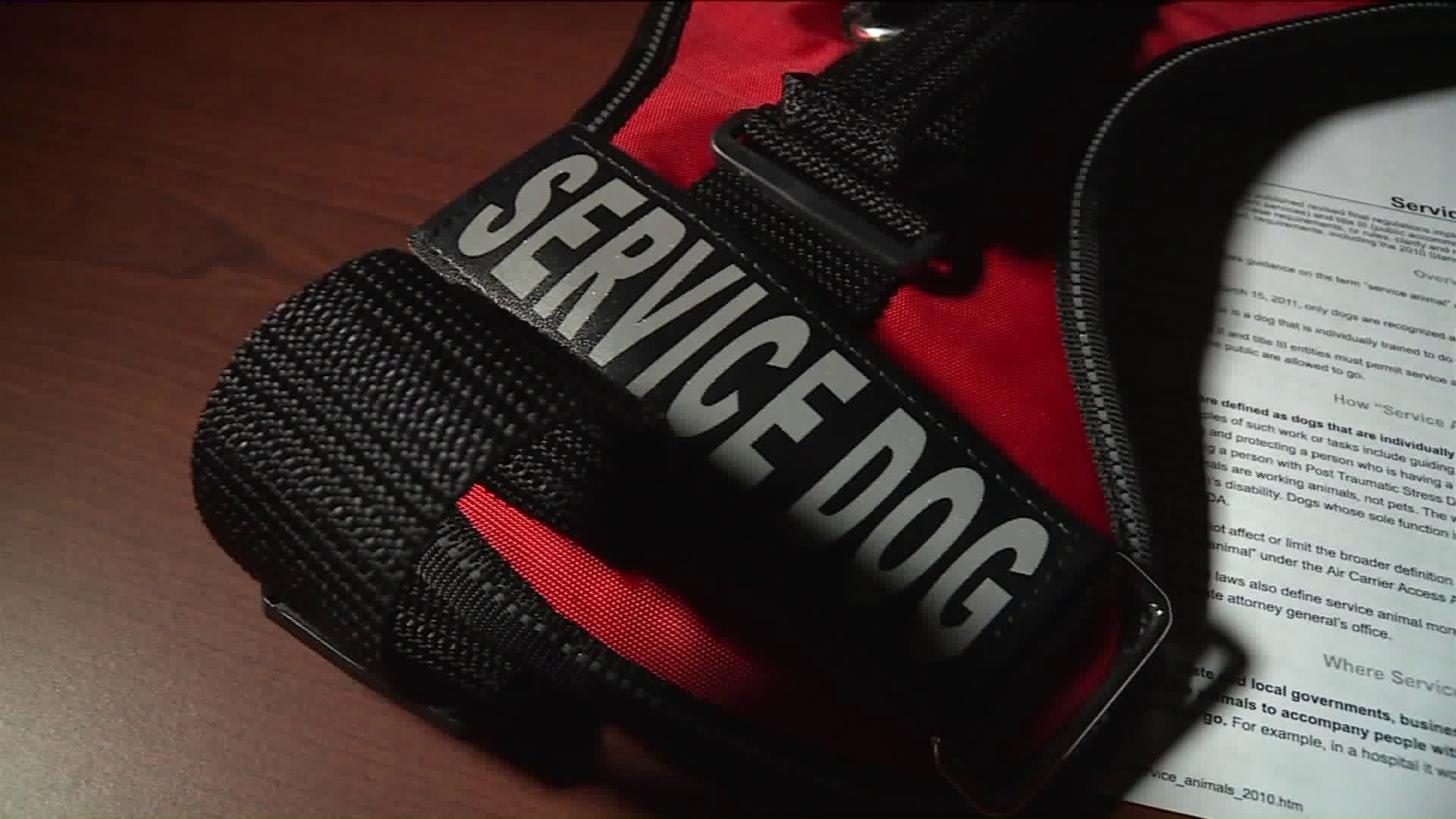HARTFORD – Fake service dogs are causing real problems for the disabled and many states are cracking down with laws to change that.
In Connecticut, there is no law against falsely claiming that a dog is a service dog.
At least 19 other states have laws in place against false representation. If you’re caught posing your pet as a service animal, you can face a penalty of a fine, or in some states, you can be charged with a misdemeanor.
The Americans with Disabilities Act defines service dogs, “As dogs that are individually trained to do work or perform tasks for people with disabilities.”
Service dogs are working animals meant to help guide people who are blind, alert those that are deaf, calm a person with PTSD, etc.
Therapy and emotional support dogs are not considered service animals under the ADA.
The ADA gives service animals and their handlers access to public places such as restaurants, businesses, government buildings, etc. Under this law, the dog owner can only be asked two questions:
- Is the dog a service animal required because of a disability?
- What work has the dog been trained to perform?
In order to protect the privacy of someone that is disabled, the ADA makes it illegal for an establishment to ask about the persons disability or request proof.
It’s easy to go online, order a vest, put it on your pup and pass it off as a service dog. FOX61 found service dog credentials sold on the internet from under $10 to more than $100.
Thompson page said it’s difficult for establishments to tell the difference between a service animal, therapy dog, and house pet.
“The problem is the restaurant owner, the bus driver, all those people that certainly want to comply with the law are now confronted with all these dogs, they all look the same, they all have the same clothing on,” Attorney Thompson Page said. “The ADA has a lot of provisions to protect people and it should but that's where the rub starts, that's where the problem arises because they can’t ask questions and they can’t ferret that out.”
Fidelco is a Bloomfield-based non-profit organization that breeds and trains German shepherd guide dogs for the disabled.
President and CEO Eliot Russman said it takes two years, 15,000 hours and $45,000 to get each Fidelco dog ready to work. Russman believes someone’s decision to use a fake service dogs can put real dogs in service at risk.
“I think it's harmful to legitimate service dog users because it does two things, compromises their safety and it also compromises the legitimacy and causes confusion in the public about what a real service dog is versus what a fake service dog is,” he said. “My own personal opinion is, it's immoral for someone to go online buy an ID buy a patch or a vest that they can slap on a dog because they wanna go into a restaurant and not leave the little dog at home or fly and not pay the $50 or $100 fee.”
Russman said if their guide dogs are attacked in harness by loose pet dogs or fake service dogs, the Fidelco dog has to come out of service because when they’re attacked in harness, that’s the last thing they remember.
“There’s so much invested in this relationship, in this partnership for us,” wounded veteran Don Overton said talking about his guide dog Pierce.
Overton medically retired from the United States Army in 1992 after sustaining a blinding blast injury in Iraq. He served with the Army’s 82nd Airborne Division during the first Gulf War.
“I’ve been blind longer than I’ve had sight in my life,” he said.
Prior to being paired with his Fidelco guide dog Pierce, Overton was a long cane traveler.
“I can’t even begin to tell you what it's like to travel with my guide dog,” Overton said. “It's not just a matter of how much freedom and independence I have but also my family, they don’t worry about me anymore.”
Overton said he and Pierce have faced challenges going into public venues with other untrained animals.
“We’ve had situations in terminals in airports where we go in he’s working so he’s in harness doing his job, and those other animals might not have the same level of training and their handlers might not have the same level of training so we’ve had situations where small dogs have charged at him and he might react, a startle response,” Overton said.
He said its not that his dog wasn’t controlled, he sensed a situation but he immediately self corrects due to his training.
His main concern is other animals decommissioning his animal.
“If he were to go out and be attacked and possibly have to be decommissioned because he couldn’t work anymore because he has that apprehension now, he’s not capable of guiding,” Overton said. “It's a safety issue for us, it's obviously a safety issue for the animals.”
If you’re out in public, a true trained service dog will be very well behaved, almost invisible, according to Fidelco. They won’t be seen sitting at a table or chasing other animals.
Overton said when Pierce’s harness comes off and he’s not working he gets to be a normal dog and enjoy time at home with his family.

